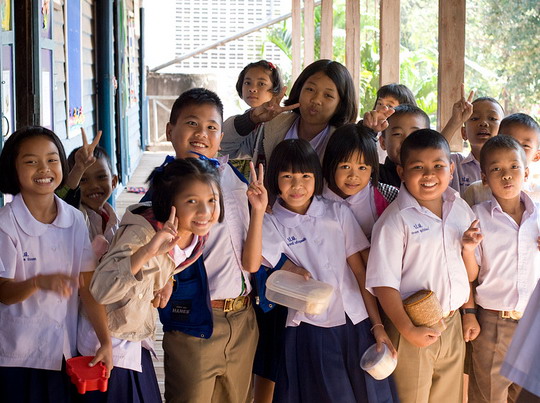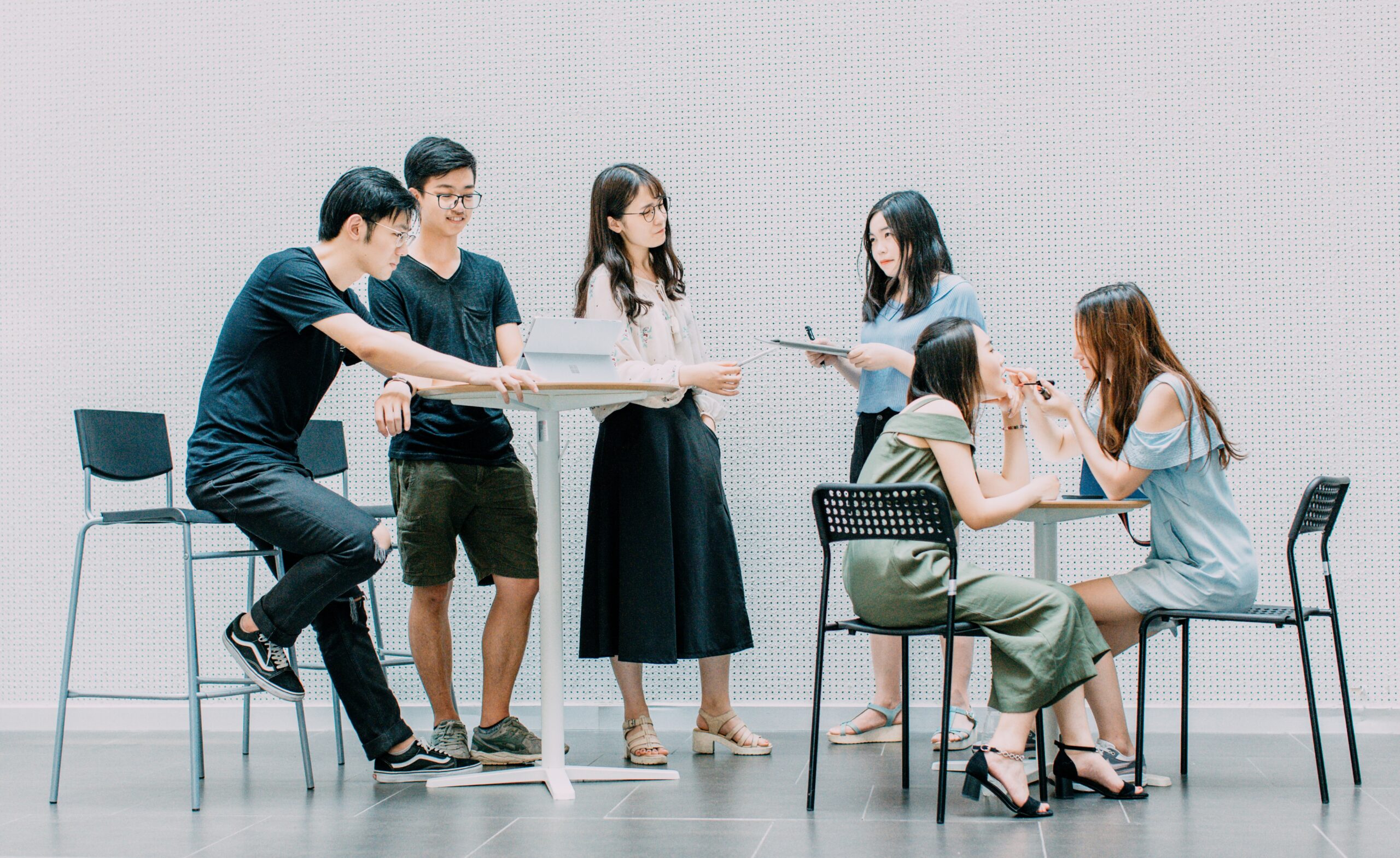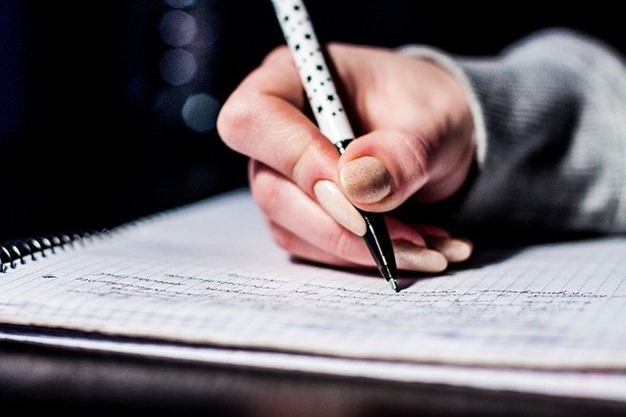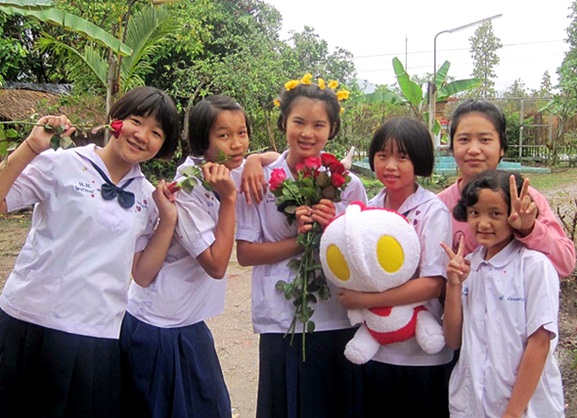
When most teachers arrive in Thailand to look for a job teaching English, one of the first things they consider is whether to apply for jobs with government schools or private schools. With pros and cons for both Thai government schools and Thai private schools, most teachers have a hard time making a decision.
If you’re looking for a job teaching English in Thailand and also worrying about if a government or private school is better for you, look at the following pros and cons of each. After all, no school is perfect and what is good for some teachers isn’t always good for others.
Teaching at a Thai Government School:
Pros-
1. One of the advantages of teaching at a Thai government school is the stability of the school. With some Thai schools being a bit iffy about paying on time, most Thai government schools, although they don’t pay a high salary, do usually pay their teachers on time.
2. In most Thai government schools, the ‘office politics’ seem to be less than in private schools. Teachers don’t have to play the game of sucking up to whichever staff has more power, which leaves them time to get on with their jobs.
3. Longevity in Thai government schools is more guaranteed. For Thai teachers, many of them will teach at the same Thai government school from graduating from university to retirement. Government schools tend to have a more stable curriculum, without the constant ‘let’s try this’ of some of the private schools so, if you can get a job at a government school, you’ll likely be able to stay as long as you want.
4. At most government schools, lunch is included in the teaching packages. This may not seem like a particularly great perk, but when you think you’ll end up saving over 1,000 baht a month (around $32), that may not seem much but, over a year, for most teachers that’s two months’ rent.
5. Most western teachers report Thai students study harder at government schools, so teaching there is often more rewarding.
6. The respect a teacher gets from students at a Thai government school is usually higher than at a private school. Overall, the students are poorer and are brought up with ‘true Thai values’, unlike at some private schools where many of the kids are wealthier and are more like western kids, with very little respect for teachers.
Cons –
1. Rules can be stricter at government schools and you will be expected to adhere to them. Dress code, clock-in and clock-out times, teacher behavior etc. is more closely monitored at government schools. If you don’t mind the rigidity, this may be a good choice for you. For other teachers who don’t like to be in such a controlling environment, private schools may be a better choice.
2. Another disadvantage of Thai government schools is the classroom size. With upwards of 55-60 students in a class, it can make it difficult to do anything creative or fun and classroom control can become an issue for teachers who are less strict.
3. Government school salaries are much lower than private schools, with an average monthly salary only around 25,000-32,000 baht a month ($755-970).
4. Government schools sometimes have more weekend requirements than do private schools, with teacher-parent days, sporting events, camps and more required of the teacher.
5. Many government schools have some or all of their classrooms non-airconditioned. As Thailand is one of the world’s hottest countries, teaching in a classroom that’s 90 degrees half of the year with only a fan to cool you off can make your teaching experience extremely unpleasant.
Teaching at a Thai Private School:
Pros –
1. The big advantage for most teachers is the salary. Usually 15,000-25,000 baht a month ($450-$760) more than at a government school, that’s the difference between an annual plane ticket back to your country, eating at nicer restaurants, saving more money and a much nicer apartment.
2. Often there’s more freedom for the teachers at private schools with less monitoring of classrooms and more freedom to teach your own curriculum.
3. Vacations are often better at private schools with at least 8 weeks paid vacation every year and no need to clock in while you’re on vacation (some government schools, even if you get paid vacations, still require you to come into school every morning to clock in while you’re on vacation!).
4. Better classroom resources. The private schools just have more money. Simple. So you’ll find the libraries are better, most classrooms have overhead projectors and computers and you can usually buy any teaching materials you need, which will be fully reimbursed by the schools.
5. Smaller classroom size. Some private schools have classrooms as small as 6-10 students, which makes teaching more fulfilling as you can give students much more personal attention.
6. All classrooms will be air-conditioned and, as Thailand is an incredibly hot country, this makes your work life so much more pleasant.
Cons –
1. Some private schools seem to be unstable when it comes to keeping your job. What they liked last semester, they may not like this, and at the end of the year you could find your contract isn’t renewed.
2. The students in private schools have a reputation of being less polite than government school students (many are from wealthy families and are quite spoiled), with less respect for teachers than their government school counterparts.
3. Classroom behavior can also be a bit boisterous and the private students, in many cases, are less eager to learn than government school students. After all, many of them know they’ll be going into “Daddy’s Business” when they graduate from university, so there’s no worries about getting a good job.
4. ‘Office politics’ can sometimes be a real pain in the rear. Figuring out who has the most power in the administrative office then deciding how to ‘play the game’ to get more of what you want can be an energy drainer. Of course, not all private schools are like this but some are. If you’re good at schmoozing, you’ll love it. If not, it can be a negative on your career.
As you can see, both government schools and private schools in Thailand have just about equal disadvantages and advantages. Figure out which are more important to you, then apply for jobs in that type of school. Remember though, not every school is the same. There are good and bad government and private schools so choose wisely as one third of your life while in Thailand will be spent there.



